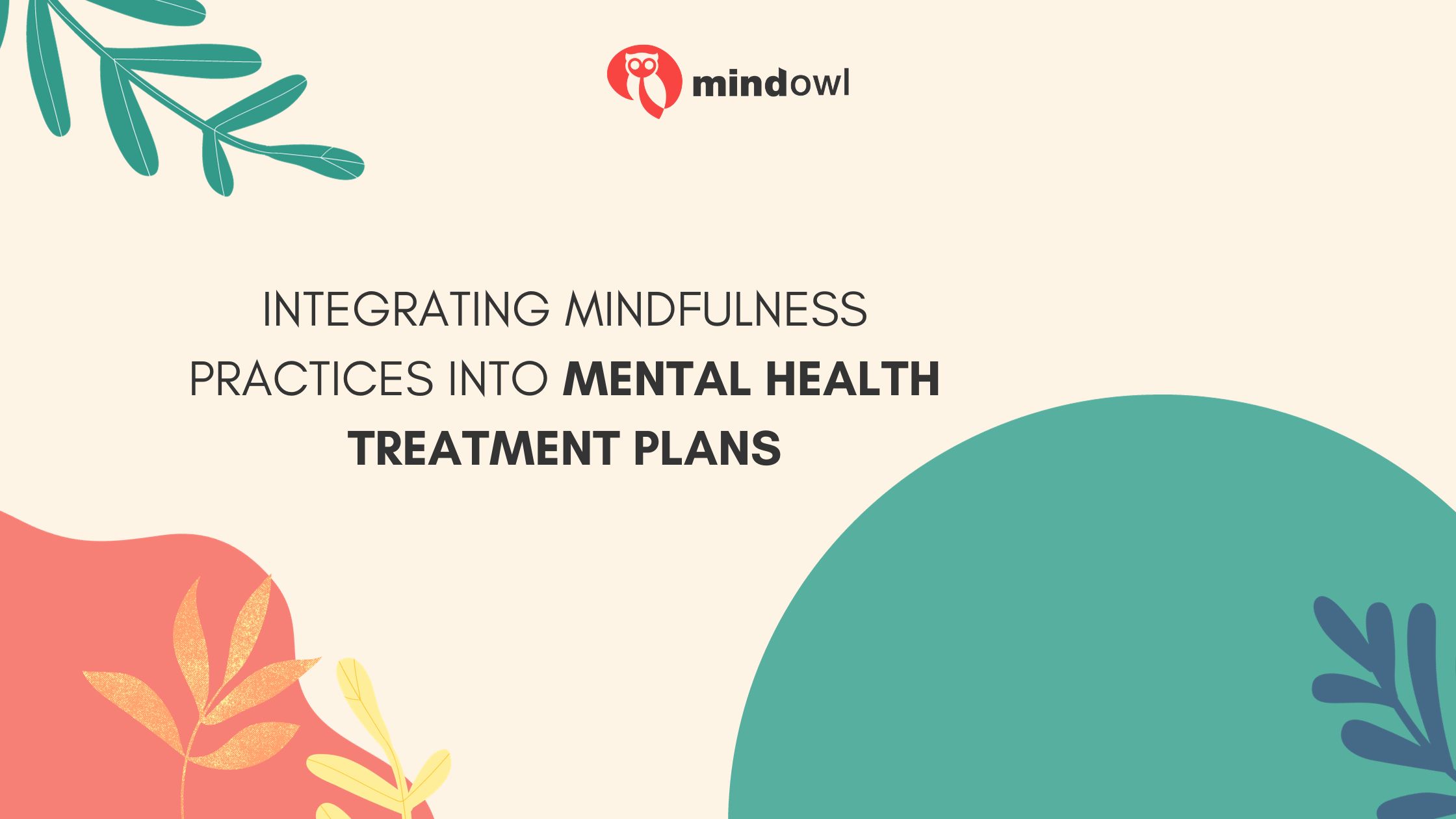In recent years, the integration of mindfulness practices into mental health treatment has gained significant attention. Mindfulness, a form of mental training and meditation, has its roots in ancient traditions but is now recognized for its benefits in psychological well-being. Its application in mental health treatment offers a complementary approach to traditional therapies.
By focusing on the present moment and fostering an awareness of thoughts, feelings, and bodily sensations, mindfulness practices help individuals manage a variety of mental health conditions. This article explores how mindfulness practices are being effectively integrated into mental health treatment plans, offering an understanding of their benefits and application in modern therapy.

The Evolution Of Mindfulness
The evolution of mindfulness from its historical roots to modern adoption is a significant transition. Originally grounded in ancient practices, particularly within Eastern spiritual traditions, mindfulness emphasized spiritual and personal growth.
In the 20th century, Western psychology began to recognize its therapeutic potential. This led to the development of mindfulness-based interventions, integrating these ancient practices with contemporary psychological approaches. These interventions gained recognition for their effectiveness in mental health treatment.
Today, mindfulness is widely adopted in therapy for its ability to enhance emotional regulation and foster psychological resilience. This adoption marks a critical blend of historical wisdom with modern therapeutic techniques.
Defining Mindfulness In Mental Health
In therapeutic settings, mindfulness is defined as a mental practice focusing on present-moment awareness. It involves observing thoughts, feelings, and bodily sensations in a non-judgmental way. This practice is integrated into therapy to help clients manage stress, anxiety, and other mental health issues.
Mindfulness encourages individuals to observe their inner experiences without trying to change them. This approach can be beneficial in various therapeutic settings, including a mental health facility in Tulare. It helps clients develop a deeper understanding of their mental processes, leading to improved emotional regulation and mental health outcomes.
Scientific Evidence Supporting Mindfulness
A wealth of scientific evidence supports the efficacy of mindfulness in mental health treatment. Numerous research studies and clinical trials have shown that mindfulness techniques can significantly reduce symptoms of anxiety, depression, and stress.
For instance, a study published in the Journal of Clinical Psychology analyzed the effectiveness of mindfulness-based therapy for anxiety and mood symptoms in clinical samples. The results indicated that mindfulness-based therapy was moderately effective in improving anxiety and mood symptoms. Specifically, in patients with anxiety and mood disorders, the intervention showed significant effectiveness in improving symptoms.
Another research published in the Psychiatric Clinics of North America discusses the contribution of mindfulness practices to cognitive and behavioral treatments for depression and anxiety. It reviews the effectiveness of mindfulness-based interventions (MBIs) in reducing symptoms of anxiety and depression. The study concludes that MBIs are effective and perform comparably with cognitive behavior therapy (CBT) in treating these conditions.
These studies, among others, provide strong empirical support for integrating mindfulness into mental health treatment plans. They underscore the potential of mindfulness as a valuable tool in enhancing mental well-being and resilience.
Mindfulness Techniques
Mindfulness techniques in mental health encompass a range of practices focused on cultivating present-moment awareness and acceptance. Common techniques include:
- Mindful Breathing
Mindful breathing is a foundational mindfulness practice focusing on breath awareness. It involves paying close attention to the physical sensation of breathing: the rhythm, the sound, and the feeling of the breath as it enters and leaves the body. This practice can be done anywhere and at any time.
By concentrating on their breathing, individuals learn to bring their focus back to the present moment, which helps in reducing stress and calming the mind. It’s a simple yet powerful technique that forms the core of many mindfulness practices.
- Body Scan
The body scan mindfulness technique involves a mental scan of the body, focusing on different parts sequentially. Starting from the toes and moving upwards, individuals pay attention to sensations in each body part.
This practice promotes awareness of physical sensations, such as tension or relaxation. It aids in identifying areas of stress and cultivating a deeper connection between the mind and body. The body scan is often used for relaxation and stress management, helping individuals to become more attuned to their physical state and release held tension.
- Mindful Observation
Mindful observation is a technique focused on enhancing awareness of one’s environment. This practice involves consciously noticing and attending to various aspects of the surroundings, such as colors, shapes, movements, or details often overlooked. The observer engages with their environment without judgment, simply acknowledging what they see and experience.
This technique encourages a heightened state of awareness and presence, fostering a deeper connection with the present moment. It can be particularly useful in reducing automatic reactions to stimuli and promoting a calm, focused state of mind.
- Loving-Kindness Meditation
Loving-kindness meditation, known in the mindfulness community as ‘metta’ meditation, focuses on nurturing feelings of love and kindness toward oneself and others. This practice involves the silent repetition of phrases that embody goodwill and empathy. It starts with the individual and progressively extends to loved ones, acquaintances, and even those with whom there may be disagreements.
This meditation aims to develop an attitude of love and kindness, overcoming negative feelings like anger and resentment. It is known to enhance emotional well-being and improve relationships with others.
Each of these techniques can be tailored to individual needs and incorporated into mental health treatment plans. They are designed to improve mindfulness, reduce symptoms of mental health issues, and enhance overall well-being.
Mindfulness For Specific Mental Health Conditions
Tailoring mindfulness practices for specific mental health conditions is crucial for effective treatment. For anxiety disorders, practices like mindful breathing and observation can help in managing panic and worry. In treating depression, mindfulness can encourage a non-judgmental stance toward negative thoughts, alleviating depressive symptoms.
For those with PTSD (post-traumatic stress disorder), mindfulness aids in grounding and coping with traumatic memories. Additionally, mindfulness can benefit individuals with ADHD (attention deficit hyperactivity disorder) by enhancing focus and reducing impulsivity.
These tailored approaches ensure mindfulness techniques address the unique challenges of each condition, making them a versatile tool in mental health treatment.
Patient-Centered Mindfulness Approaches
Customizing mindfulness to individual needs is essential for effective therapy. For a patient with high stress and little time, brief mindfulness exercises like three-minute breathing sessions can be practical.
Alternatively, for someone struggling with insomnia, guided meditations focused on relaxation and sleep might be more beneficial. In cases of severe anxiety, grounding exercises that focus on sensory experiences can help manage acute symptoms. For individuals with chronic pain, mindfulness practices that emphasize body awareness and pain acceptance can offer relief.
This tailored approach ensures that mindfulness techniques address specific issues and fit into each individual’s lifestyle, making the practice more engaging and relevant.
Overcoming Challenges In Integration
Integrating mindfulness into mental health treatment can encounter challenges. One common obstacle is client resistance or skepticism. To address this, therapists can provide clear explanations about the benefits and evidence supporting mindfulness.
Another challenge is maintaining a consistent practice. Solutions include setting manageable goals and integrating mindfulness into daily routines. Therapists may also face difficulties in adapting mindfulness to specific conditions. Ongoing training and collaboration with experts can help.
Lastly, measuring the effectiveness of mindfulness can be challenging. Using standardized assessment tools can provide objective measures of progress. Addressing these obstacles is key to successfully integrating mindfulness into therapy.

Digital Mindfulness Tools
Digital mindfulness tools include a variety of apps and online resources designed to facilitate mindfulness practice. These tools often offer guided meditations, breathing exercises, and suggested activities tailored to different needs and schedules. Many provide structured programs to help users develop a regular mindfulness practice.
Some also feature progress tracking, reminders, and personalized recommendations to enhance user engagement. Additionally, online forums and communities connected to these tools offer support and shared experiences, fostering a sense of connection. These digital options make mindfulness practice accessible and convenient, supporting mental health treatment in a modern, tech-savvy world.
Future Directions In Mindfulness And Mental Health
The future of mindfulness in mental health points toward more personalized and technologically integrated approaches. Emerging research is likely to focus on the neuroscience behind mindfulness, providing deeper insights into how it affects the brain.
There is also an anticipated growth in digital mindfulness interventions, leveraging artificial intelligence to personalize techniques. Furthermore, there may be an increase in studies exploring the long-term impacts of mindfulness on various mental health conditions. This future research will enhance our understanding of mindfulness, making it a more effective tool in mental health treatment.
Conclusion
Integrating mindfulness into mental health treatment plans is a forward-thinking approach that addresses the complexities of mental health with a blend of ancient wisdom and modern science. This integration offers therapists and patients a versatile tool, adaptable to various mental health conditions and individual needs.
As research continues to evolve, mindfulness practices will likely become more personalized and supported by technological advancements. The future of mental health treatment is poised for significant transformation, with mindfulness playing a pivotal role in shaping more effective, holistic care strategies.
MindOwl Founder – My own struggles in life have led me to this path of understanding the human condition. I graduated with a bachelor’s degree in philosophy before completing a master’s degree in psychology at Regent’s University London. I then completed a postgraduate diploma in philosophical counselling before being trained in ACT (Acceptance and commitment therapy).
I’ve spent the last eight years studying the encounter of meditative practices with modern psychology.

